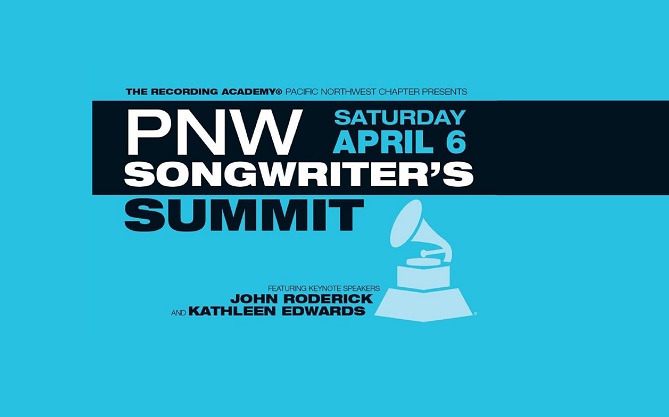I recently interviewed two of my favorite, no-nonsense women in the Seattle music scene, Robin Fairbanks (A&R) and Elizabeth O’Keefe (Operations). They are both part of a music consulting company called Setlist Music Solutions, headed up by Sean Hensley, which specializes in artist development and management. Part I of this series offers Elizabeth’s perspective, and Part II will showcase Robin’s point of view. Both of these women have a lot of hands-on experience helping indie artists succeed.
It’s no secret that the options for self-promotion are greater than ever before for musicians. As a DIY independent artist myself, I often find it overwhelming just to understand all the different business and marketing things I need to do on a daily basis in order to be successful – to say nothing of actually getting them all done – and I have an MBA (and experience in marketing!) Like many artists, I fantasize about a record label riding in like a white knight, begging to sign me and to do all the work to promote my career as a musician. While this still happens for some artists, for most of us, it’s important to move forward with the reigns of our careers still firmly grasped in our own sweaty, trembling hands.
So what’s a girl to do when she realizes there is no way she can do it all herself?
Boutique Label
The idea of a boutique recording or music label has been around for a while, and has been written about in articles like this in-depth Baltimore City Paper article published in 2010 or in this article about the Arizona-based Cosmica Artists label. While the terms indie label and boutique label often seem to be used interchangeably, a boutique label generally focuses on a small artist roster, or even a single emerging artist. It may even be started and owned by a producer, or the artists themselves. It could be a non-profit artist collective.
The signed artist(s) may do none, or some of their own marketing. The boutique label may or may not act like a traditional label, providing (and funding) most or all of the services an artist needs, from recording to promotion, booking and tour management. Artists may have to pay for some, or all, services provided, but they get to say they are “signed” to a label. Boutique labels will not sign just anyone, but they might take a chance on a relatively unknown artist. The artist and label’s brands are associated with each other. The boutique label generally chooses the artist, not the other way around.
Indie Label
An indie label, on the other hand, operates more traditionally (generally speaking). It signs a roster of artists and does all their marketing and managment. It invests in and counts financially on making one or more of those artists pop and yield a big return on their investment. Indie labels traditionally spend the money on artist development and marketing up front, and take the lion’s share of the resulting revenue, although artist contracts are evolving. One example of an indie label is Seattle’s iconic Sub Pop Records. These guys know what they are doing, and will only sign artists these days who already have a significant following (read: revenue-generating potential). The artist becomes a representative for the label’s brand. Again, the label chooses the artist.
Independent Consultant/Agency
In yet another model that is increasingly common, a musician or band contracts with and pays (generally up front) for services from individual music industry freelancers or specialized agencies as needed, such as management, booking, tour support, recording, legal advice, performance coaching, website development, PR or social media management (or whatever else they need and cannot do themselves). This can be risky, because a naive artist may not know who is worth hiring, and also because these different consultants are not operating in a coordinated fashion. There is little or no brand association between consultant and artist. Results seem to vary, to say the least, but the artist is in control.
Cafeteria Style
What I haven’t heard discussed much is the kind of label or music consulting company that is neither the indie nor boutique label nor specialized consultant/agency. It’s not created or staffed by artists or producers. Instead, it is run by professional and experienced music PR, management, or media consultants who offer their services to musicians on a fee basis, and subcontract out to trusted freelancers where called for. This kind of company doesn’t require artists to sign a “360 degree” contract, although, like Setlist, it may have a small roster of artists it does sign. Much of its revenue comes, however from providing a comprehensive menu of services to artists on a project-by-project basis, all under the same brand, and in a coordinated fashion. The artist is free to pick and choose those services they need most and can best afford. There may or may not be brand association between consultant and artist, but the artist is definitely in the driver’s seat (with lots of advice and coaching).
Elizabeth aptly calls this “Cafeteria style.” In this interview, she talks about the industry and what makes Setlist Music unique. Her vast experience making music playlists for restaurant marketing is paying off greatly.
Q0: Elizabeth, can you introduce yourselves to our readers?
E: Originally from Portsmouth, NH, I spent my formative years traveling the world as a Foreign Service kid, having lived in five different countries until I landed in Seattle in 2000. I spend my days as a Program Manager, but on the side, I’m the Operations Manager for Setlist Music Solutions, a PR and music consulting company based in the Seattle area. Prior to that role, I was the Operations Manager for Critical Sun Recordings. In between, I served a brief stint as the booking manager for Afraid of Figs, a Seattle pop-rock band. Currently, I’m Secretary for the Board of Trustees for the College Club of Seattle and a Board Member for Music Aid Northwest.
Q1: What brought you into the music business?
E: I started my music career by doing promotion for some friends of mine, who were both classical artists. One was a well-known pianist who had released several albums which were being sold worldwide, but he had no idea how to promote his work or get in into an online/downloadable format to increase visibility and sales. I took on the role of his publicist and helped package him up and pushed him out onto the internet. The other was a classical vocalist with a very niche market appeal who needed help with branding and marketing. As I was working with him, I met a man named Bubba Jones, the CEO of Critical Sun Recordings who has worked with many Grammy-award winning artists and producers. At some point, Bubba was looking for someone to help build out his label and recording studio business. That was my first real foray into production and the business end of the industry.
“Record labels are just modern-day patrons who may (or may not) pay to develop the artist. What an artist really needs to be successful in this world is a really, really, really good publicist.”
Q2: How have you seen the music industry change, especially for labels and management?
 E: I recently attended a talk sponsored by the PNW Chapter of the Recording Academy with Meshell Ndgeocello. Meshell shone a lot of light on the issue for me. What she said has been burned into my brain since, as I believe it to be so true (and I’m paraphrasing here): “Record labels are just modern-day patrons who may (or may not) pay to develop the artist. What an artist really needs to be successful in this world is a really, really, really good publicist.”
E: I recently attended a talk sponsored by the PNW Chapter of the Recording Academy with Meshell Ndgeocello. Meshell shone a lot of light on the issue for me. What she said has been burned into my brain since, as I believe it to be so true (and I’m paraphrasing here): “Record labels are just modern-day patrons who may (or may not) pay to develop the artist. What an artist really needs to be successful in this world is a really, really, really good publicist.”
I’ve been obsessed with this notion since. When you think about it – a lot of the current Top 40 artists are highly polished, over-produced, money-making machines. This is not because they are more talented than other artists you see on a Seattle stage any given Saturday night, but because they have the benefit of a corporation behind them; people who know people who have the money to invest in whatever talent was gifted to the artist. Say what you will about the Britney Spears’ or the Miley Cyrus’ of the world – their God-given talent is that they are ENTERTAINERS. It doesn’t matter if they cant carry a tune in a tin can. They have the look, the feel and the right people behind them pushing them out into the world with a corporate thumb in their back. But are they necessarily the happiest people? Maybe not.
How can you possible stay true to your craft – and by extension, to yourself – if all you are doing is standing on a stage and doing the biding of a machine? Or think about these reality shows that are so popular: what better way to take an undiscovered artist – a diamond in the rough – polish them up and put them in the shining spotlight, than to stick them on national TV? But there is a price to that; read the fine print. You sign your life over to the Network, to the Record Label, to the Management Company for 7-10 years. What’s left for you?
“Most musicians in this tier can’t afford to hire a big-time publicist to help make it happen for them, so they are forced to surround themselves with people who will offer their services for free, but are oftentimes just attracted to the idea of working in “The Biz” and may or may not stick around for the duration.”
Here’s the thing…at the indie level, you have to be frugal and more importantly, you have to be smart. Most musicians in this tier can’t afford to hire a big-time publicist to help make it happen for them, so they are forced to surround themselves with people who will offer their services for free, but are oftentimes just attracted to the idea of working in “The Biz” and may or may not stick around for the duration. Everyone knows someone who can help make them famous. The problem is, not every is as connected as they claim to be and if they are, they don’t want to abuse those connections. And not everyone is cut out to be a “manager”. I’m willing to bet if you interviewed all the people who claim to be managers in this town, a very small percentage of them would actually understand what that role entails.
I’m often approached by artists looking for a manager. I’ll sit down and talk to them, only to quickly realize they aren’t ready, nor do they really want management. They just want someone to find them gigs so they can get up on stage, play their guitar and sing songs. They want someone else to handle all the business. In my view, a manager is the business PARTNER to the artist. Yes; a manager handles the lion’s share of the work, but it’s a relationship that involves strategic planning and constant reassessment. The manager-artist relationship is symbiotic and requires constant communication. It’s not about hiring someone to go out and get gigs for the musician and telling them when and where to show up, then making sure they show up on time (albeit, that is certainly an important part of the game!) It’s a relationship that involves mutual goal setting, planning, budgeting and scheduling.
“If an artist isn’t ready to embrace the business side of music, then all they are is just a hobbyist.”
If an artist isn’t ready to embrace the business side of music, then all they are is just a hobbyist. And that’s absolutely fine – I know many hobby musicians who go out and play on Friday nights or at summer music festivals, solely for the sake of playing and they are happy with that. But if your only goal in life is to “get rich & famous quick,” then I suggest you find another career because this business is HARD and it is more than just about being a STAR. You need to go all-in and be very strategic about how you can build your life in music.
“Not everyone can offer promotional and PR services, style and branding services, business management, legal and financial services, vocal and stage presence training….all of those things require specialized skill sets.”
In terms of what an artist needs to be successful, I think companies like Setlist Music Solutions who take a Cafeteria style approach to the business can be the most effective. Anyone with decent sales skills can book for a band. Not everyone can offer promotional and PR services, style and branding services, business management, legal and financial services, vocal and stage presence training….all of those things require specialized skill sets. And I’ve seen time and again – you get what you pay for. Say you have an “intern” who is managing your social networking strategy. Well…that intern will likely do a bang-up job for you the first 2 weeks or so, but as soon as the sheen starts to wear off, that unpaid intern is going to all of a sudden have family/health/school issues that preclude them from working for you.
Here’s the truth: EVERYONE NEEDS TO EAT. And if you can’t afford, or figure out how to otherwise compensate good help, then you are likely going to fail. Sadly, it does take money to make money. Rather than going out on Saturday night drinking PBRs and smoking entire packs of Marlboros, put your money aside and invest it in something that could actually help you in the long run.
Q3: Can you share the story of a particular artist or band that you feel illustrates the new music industry model especially well?
 When I think of artists in the Seattle scene right now who seem to be using their resources well and being strategic in their approach, Kris Orlowski comes to mind. I’ve watched his career strategy shift over the past couple years and he’s done a really good job of surrounding himself with excellent people and being thoughtful about his touring schedule. Of any artist, I feel he’s the most commercially viable out there right now. Does that mean he will find commercial success on the national stage? I don’t know…I guess time will tell on that one. But I do know he packs out his shows and people respect him as both a person and an artist. He’s got a very generous heart, but he’s also very good about maintaining a boundary between his artistic life and his personal life.
When I think of artists in the Seattle scene right now who seem to be using their resources well and being strategic in their approach, Kris Orlowski comes to mind. I’ve watched his career strategy shift over the past couple years and he’s done a really good job of surrounding himself with excellent people and being thoughtful about his touring schedule. Of any artist, I feel he’s the most commercially viable out there right now. Does that mean he will find commercial success on the national stage? I don’t know…I guess time will tell on that one. But I do know he packs out his shows and people respect him as both a person and an artist. He’s got a very generous heart, but he’s also very good about maintaining a boundary between his artistic life and his personal life.
“I also know when I walk into a venue I can tell he’s playing before I even can see the figures on stage. His sound is very unique and representative of where he’s been in his life and his love for his hometown.”
Another artist I’ve been keeping an eye on is Ayron Jones. That guy can wail… he’s a really fantastic mix of soul and rock. People criticize his look, but I actually think it works for him. That angled cap has become part of his identity. I also know when I walk into a venue I can tell he’s playing before I even can see the figures on stage. His sound is very unique and representative of where he’s been in his life and his love for his hometown. He’s another one who’s been very strategic about who he surrounds himself with. Everyone I have dealt with in his camp – from his booking manager to his lawyer – have been knowledgeable and professional.
Accent on the professional. It’s key in this business and all too often, missing from a lot of these relationships.
What a lot of great advice from Elizabeth for indie artists. I’ll be publishing my interview with Robin on this blog next, as Part II in my Case Study of Setlist Music. She has a ton more add from her many years of experience in the music industry in radio, song writing, publicity, and artist management – to just a few areas of her expertise. I’d love to hear your thoughts and comments on my interview with Elizabeth, so please feel free to leave them below.





8 comments
Great interview and good advice on cafeteria style!
What Meshell Ndgeocello says …the publicist cause that’s who shops u around and the right one has the contacts u need. Needless to say gotta have the lawyer and management too.
Thank you, wonderful article.
Thanks, Joe. Thanks for the feedback!